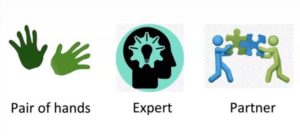How Emotional Intelligence Can Help You Thrive in the Age of Zoom
ASG Co-founder Doug Austrom offers insights that can help you take your performance to the next level.
Working with other people can be challenging. Exercising emotional intelligence and fostering collaborative relationships is a vital part of life and work. ASG Co-founder Doug Austrom honed his people skills as a consultant at ASG. In this Q&A, Doug shares insights on how developing your emotional intelligence can make you better at what you do.

What exactly is emotional intelligence?
Emotional intelligence is a level of self-awareness — our ability to recognize and understand our emotions and triggers — and then manage them. It’s using the awareness of your emotions and the emotions of others to not only manage relationships, but to foster positive interactions and handle conflict well. Once you’ve done enough self-reflection and built a high level of self-awareness and self-management, you don’t have to focus as much on yourself and you can be open to what’s going on with others.
Emotional intelligence is a level of self-awareness — our ability to recognize and understand our emotions and triggers — and then manage them.
That means listening more than talking. It’s so important to listen when you’re in a leadership role. It’s the sincerest form of genuine respect. In consulting, it’s understanding where the client is coming from and determining what their unspoken needs are. This is the exercise of influence, which is seeking first to understand and then to be understood. Sometimes consultants have to listen for the underlying message, tone or feeling being shared. Having this social awareness and competence leads to effective communication and leadership. That is why emotional intelligence is a foundational competency of effective consultants.
What is emotional intelligence not?
People exhibit the lack of emotional intelligence when, instead of responding, they react in certain situations. It’s reacting on whatever emotions are triggered and lashing out. It’s completely lacking self-awareness. A leader who lacks emotional intelligence may threaten others or seek to instill fear as a primary motivator. It’s an old-school way of leading that doesn’t work particularly well anymore.
In consulting, there can sometimes be an attitude of blaming others and pointing out to the client how little they know about the project. This is not an effective consulting method. The best method is to couple a high level of humility with quiet confidence — not arrogance — that allows one to understand that there are other dynamics that the client’s dealing with.
How can emotional intelligence lead to effective leadership?
It all goes back to systems engineering and understanding the whole system and how all the pieces fit together. The emotional intelligence part is a key component to really addressing the whole system. You’d think this is about engineering and commercialization, which is what we partner with clients to do at ASG, but the reality is that, on these projects, that’s often the easiest part. It’s how you work with all the different suppliers and departments of the client that can be more challenging. Systems engineering as a way of understanding the whole picture and complexity of these projects is critical. But it still comes down to people and relationships. Being emotionally intelligent is critical to developing constructive and collaborative relationships with colleagues and clients.
That style of consulting is a form of leadership. Effective leadership is choosing to hold oneself accountable, and it requires the exercise of influence. As an external entity and consultant, you have no formal authority which is what traditional leadership relies on. How can you most effectively influence and support the client without that authority? Emotional intelligence is the foundation of that.
Hoes does ASG’s cultural focus on emotional intelligence make the company different from others?
ASG is looking to establish strong, partner-like relationships with clients. Over the years, one of the things we’ve focused on is the desire to move beyond just a body shop and never being regarded as just a body shop. In other words, we’re much more than just a few extra sets of hands to help get the job done.
Most clients are looking for a pair of hands, which is a basic value proposition that consultants bring to clients. ASG seeks to handle that aspect of consulting, but also bring a degree of expertise and value — the other two value propositions — so that it’s more of a partnering relationship. We’re becoming increasingly adept at working more collaboratively. You can’t establish a true partnering relationship if you aren’t collaborating with the client.

One ASG team member that’s really good at this is Katie Krock (see sidebar). She’s in a challenging position as a scheduler. She has to be able to gently guide clients to make sure projects get done. As an external consultant, she has no official authority. She’s had to learn how to be really effective with influence and fostering relationships with people.
Is this way of working more important than ever right now, with the social and political climate as well as the pandemic? How can this tool benefit people?
It’s much more challenging now because of the inability to meet in person. It’s harder to read a room and get a sense of the emotional climate. Right now, our interactions are entirely two dimensional. So fostering emotional intelligence is even more critical — as well as more difficult.
You have to really pay attention and be fully present. There’s no multitasking if you want to get a sense of what the other person is saying, thinking and feeling. Basically, you just have to listen harder — for tone, intonation, pauses and for the meaning between the lines. It’s a lot of work, but it’s worth it!
ABOUT DOUG AUSTROM
Doug is currently an adjunct faculty member at IU Kelley School of Business as part of the Direct Online MBA program. He often teaches MBA students the same types of leadership skills and tools that he shares with the ASG team. Emotional intelligence is one of them.
In the mid to late 1980s, he and ASG Co-founder Pete Howard formed Turning Point Associates, where they worked mostly in organizational effectiveness and change management. In more recent years, they began recruiting individuals who were working for larger organizations but wanted to work more independently. Doug Koeneman was one of them. As a team of three, they decided to seize an opportunity to offer a more comprehensive approach to support clients and their projects. ASG morphed out of that.
Doug now plays a vital role as a partner of ASG. Through his executive and leadership coaching, Doug is giving ASG team members the gift of choice: the split-second decision to not react and go to a highly emotionally charged place, but rather to take a step back and respond in a way that keeps the agenda moving forward.






